
| Keynoter David Suzuki Issues “The Nature Challenge”
Suzuki congratulated AIA members on the conference theme of Growing Beyond Green. “I’ve been watching the themes of green buildings skyrocket over the last few years,” he said. It is especially gratifying, he noted, that passive technologies that once were considered way out there have now become mainstream.
Suzuki learned that the Number One concern across the board is the environment. “That’s not surprising,” he said, “we can easily see the effects of global warming in our country“: Melting ice, pine beetles destroying tree stands because the winter no longer gets cold enough to kill them off, polar bears in danger of extinction, salmon who can’t reach their spawning grounds. He noted that the people are ready for change. “They want carbon taxes, effective and affordable rapid transit, green business rewarded and polluters punished, protection for endangered species. They are sick and tired of political rhetoric and posturing,” he said, to rousing applause from the audience. People are sick and tired of political rhetoric and posturing That amazing moment
A very big footprint There are so many of us humans on the planet, we leave a giant ecological footprint Suzuki pointed out that we have developed an enormous appetite for “stuff” since World War II, and, consequently, we need more space because we have more stuff. “We have become a force such as has never existed on this planet,” he said. We now have to ask the question: What will all 6.5 billion people on the planet have to do? We are no longer tribal—we must be global. In other words, we have to look at the collective impact of all of us. For more than 40 years, all of the leading scientists have been telling us we’re on a dangerous course, Suzuki stated. In 1992, 1,600 scientists signed a statement warning that the planet will not be able to be sustained—for perhaps as little as two decades—if we stay on the current, energy-hogging path we are on without a great change in the stewardship of the world. “There was no media response. That, ladies and gentlemen, is truly terrifying.” Why are we turning our backs on the major strategy that got us developed—our intelligence? Suzuki asked.
We can’t have an economy that uses our air, water, and soil as a garbage can What do we do?
The good news is, there’s a lot of good news out there, he concluded. We have to start doing things as individuals: what we eat, where we live, how we move. One of the most exciting things the Suzuki Foundation has done is to look ahead to 2030 and ask what kind of environment would we like? Everybody agrees on the vision—and a target, which is termed “sustainability within a generation.” Individuals can sign up for “the Nature Challenge” and pledge to take 3 out of 10 actions. Harvard University is currently working on an American model with the Suzuki Foundation. For more information, visit the Suzuki Foundation Web site. So, what will you do? See the list at the right. |
||
Copyright 2007 The American Institute of Architects. All rights reserved. Home Page |
||
news headlines
practice
business
design
The Suzuki Foundation counts as the 10 most effective things an individual can do, (details can be found at the Nature Challenge site):
1. Reduce home energy by 10 percent
2. Eat meat-free meals once a week
3. Buy a fuel efficient, low-polluting car
4. Choose an energy efficient home and appliances
5. Stop using pesticides
6. Walk, bike, or take transit to regular destinations
7. Prepare your meals with locally produced food
8. Choose a home close to regular destinations
9. Support alternatives to the car
10. Get involved, stay informed
Many thanks to McGraw-Hill Construction, one of our Founders Circle Sponsors of the AIA150 and Official Media Sponsor, which provided funding for this inspiring session.
David Suzuki, after receiving a doctorate in zoology from the University of Chicago, served as a professor at the University of Alberta. He hosted the CBC award-winning series, “The Nature of Things” and the eight-part PBS series, “The Nature of Life.” Recipient of the Order of Canada, UNESCO’s Kalinga Prize for Science, the United Nations Environmental Program Medal, and the Global 500, Suzuki founded the David Suzuki Foundation, a nonprofit organization dedicated to finding innovative solutions to help conserve the natural world. He also is the author of 33 books, including 15 for children.
Photos by Aaron Johnson, Innov8iv Design Incorporated.

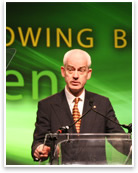 Summary:
Summary: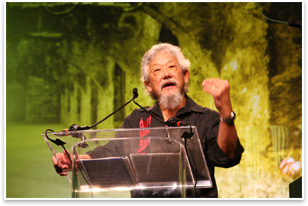 The people have spoken
The people have spoken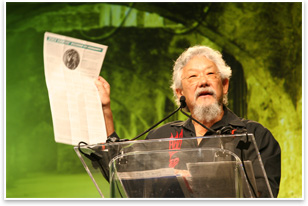 “I was swept up for almost 35 years,” Suzuki said, “fighting against unsustainable logging processes in Canada. If we continue, in 20 years there will be no more large trees.” If we continue our current fishing policies, every commercial fish will be gone by 2048. “This is the moment when all those factors come together.”
“I was swept up for almost 35 years,” Suzuki said, “fighting against unsustainable logging processes in Canada. If we continue, in 20 years there will be no more large trees.” If we continue our current fishing policies, every commercial fish will be gone by 2048. “This is the moment when all those factors come together.”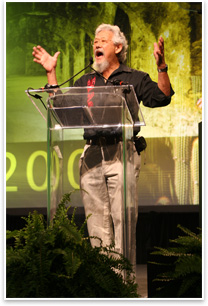 Major disconnects
Major disconnects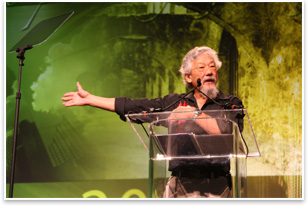 The bottom line is that we are animals. We can’t have an economy that uses our air, water, and soil as a garbage can, Suzuki concluded. “We need love. Children who are not loved grow up as dysfunctional human beings. We need loving family and communities. We need spirit—the humility and understanding that we are part of the natural world.
The bottom line is that we are animals. We can’t have an economy that uses our air, water, and soil as a garbage can, Suzuki concluded. “We need love. Children who are not loved grow up as dysfunctional human beings. We need loving family and communities. We need spirit—the humility and understanding that we are part of the natural world.